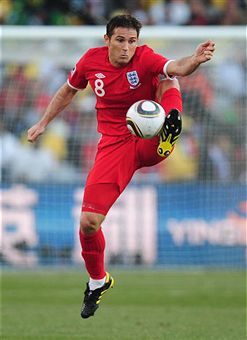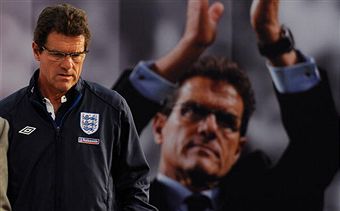Okay, we’ve all calmed down a little, we’ve had time to consider and reflect and, if we’re honest, most of us have moved on, putting England’s display in South Africa behind us.
But before we do confine it to the annals of historic footballing let downs, let’s look at the experience from a different perspective; what can we learn from the numerous reasons offered for the failure which could improve our own performance in whatever it is we do for a living?
From the many that have been offered, whatever the reason(s) you believe for the poor display of our national team, a closer examination of most will offer lessons we can all apply. I have selected but a handful.
Underperformance syndrome has been offered as a possible reason following the poor display against Algeria. In short, the players were over focused and lacked “positive distractions” during the six weeks they were away leading to a decline in performance.
Capello, a successful club manager, was new to the different challenge of taking a squad of players away for (what was effectively) a six-week camp and possibly failed to focus on the important non-footballing requirements such a stint away from home brings; every “project” brings with it a different set of challenges. If the problem, in part or in whole, was a result of Underperformance Syndrome then that offers a basic lesson for us all:
Just because a strategy or tactic has always worked in the past doesn’t mean it always will in the future or in a different environment
Following England’s exit, many were quick to blame the players. We often see this in business, poor performance blamed on staff not management. Well, sometimes it is, sometimes it isn’t but before jumping to conclusions management should always be prepared to self reflect and review, honestly asking the question:
 What did I/we do that may have had a negative impact/effect on the desired outcome
What did I/we do that may have had a negative impact/effect on the desired outcome
Much was also made by expert analysts during the World Cup that England’s players were not used to maximum effect. Frank Lampard (picutred) may have been a great example of this because his performance in comparable systems for club and country can be compared.
When Carlo Ancellotti took the reigns at Chelsea he was as keen on deploying a 4-4-2 formation but Ancellotti and Chelsea fans saw much effort but little return from Lampard in this system. Ancellotti realised that the players at his disposal were more suited to a 4-3-3 formation, changed to it and in the second half of the season Lampard looked his old self, banging in goals and pulling the strings in the Premier League’s highest ever scoring team.
Capello seemed to have overlooked this piece of “intelligence” trying to fit not just Lampard but others too into unfamiliar roles. World class players like Lampard, Rooney and Gerrard suddenly became only “very good” players at a tournament where “very good” is the average.
What lesson can business take from this?
Ensure your staff are being employed to maximise the benefit they bring to the organisation
This brings us to another element of the failed World Cup campaign that has had many pointing fingers; that of Capello’s rigid, almost slavish, following of a 4-4-2 formation. You may even have been one of those pointing the finger but what of your own work environment? Are you just as unbending as Capello or do you recognise the need for flexibility in the demands of each new project (ie opposition)? Or can you adapt to ensure you meet a rapidly approaching deadline ahead of your competition (ie chasing a goal without conceding another as the clock runs down)?
 Don’t be too rigid in your approach to achieving challenging goals
Don’t be too rigid in your approach to achieving challenging goals
Before the World Cup much was made of the Capello Index which then emerged in the Italian media after the tournament. Such public scrutiny of performance by the media is one thing but by management? How would your staff feel if their annual reviews were held in public with score cards posted on the company notice board?
Such public ranking of performers in his care recently contributed to another “Head of Performance” losing his job when Dave Collins received much criticism for his very public scoring of Britain’s athletes. Capello, it seemed, had not done his homework nor had he considered the negative impact such public scrutiny could have on ANY working relationship.
Staff appraisal and feedback is best kept private
Of course, if things are going well, public praise can be a great way to boost egos and performance. There are infinite ways in which a manager needs to consider, consult, defend, attack, praise, train, support and much more if he/she is to be not only ‘the Boss’ but a leader too. Indeed many managers fall short on realising that:
Great leadership is about far more than simply telling people what to do
Of course, the above “lessons” are based on assumption and simplification of issues that may or may not have been factors during South Africa 2010. But, remove the football analogy and the lessons remain for all who aspire to achieve things in whatever line of work they are in.
One final area to consider, one which may have been demonstrated when a clear goal was disallowed in the Germany game. Sometimes things will go wrong which are unfair and/or unjust. In real life these things happen. Which begs the question:
Can you raise your game to ensure they don’t undermine your results?
Jim Cowan is a former athlete, coach, event organiser and sports development specialist who is the founder of Cowan Global, a company specialising in consultancy, events and education and training. For more details click here

